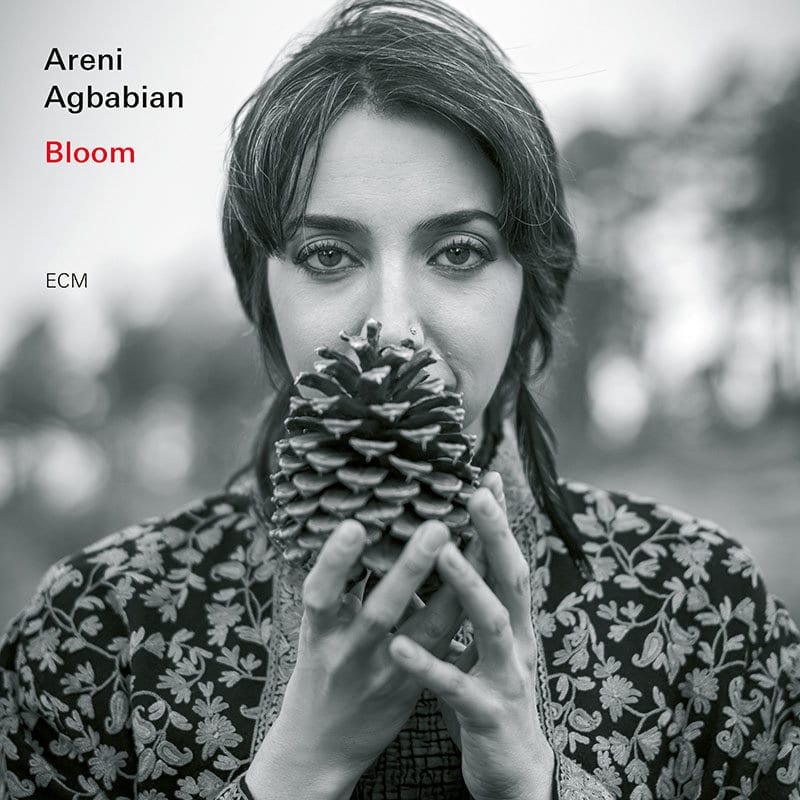
It takes a special talent to garner a personal endorsement from the ever-innovative jazz pianist Tigran Hamasyan, but Areni Agbabian comes by it honestly. For over six years, Agbabian has sung with Hamasyan, collaborating with him on several albums and many more live tours. On new release Bloom, she draws from Armenian folk performances, classical choral music, and improvisatory jazz, only to defy all expectations for every single one of these genres as she puts forth a repertoire of pieces impossible to define and easy to dissolve into.
Bloom has a compact personnel list. Agbabian composes, sings, and plays piano; Nicolas Stocker weaves in bells, gongs, Tibetan singing bowls, and other touches of percussion. With the exception of two interstitial tracks credited to producer Manfred Eicher – “Rain Drops” and “Whiteness”, each just over 30 seconds’ worth of slow, stirring piano chords – two Armenian hymns, and one folk tune transcribed by ethnomusicologist Komitas Vardapet, Agbabian and Stocker also served as composers for the full album, the artistic bond they share evident in the way their pieces and performances flow together.
And flow they do. Sylphlike melodies float through the air, from Agbabian’s heart and soul to her keys and lips, forward to us. Each piece enraptures, imbued with a kind of holiness that feels untouched by earthly difficulties. Opening track “Patience” may be one of the most memorable examples, cleansing and effortless, the kind of song that has never touched the earth with its bare feet.
Of course, to think of Agbabian’s music as a substance separate from this mortal realm would be contradictory. As heavenly as the music sounds, the human element – Agbabian, Stocker, and centuries of Armenian people who have established and contributed to both the sacred and the secular traditions that so strongly influence Agbabian – is essential, inextricable from Bloom.
But Agbabian elevates it. She does not have to reach upward – she is weightless already, seemingly unburdened by temporal woes. Her sincere spirituality and a lifetime surrounded by opera, choir, and folk music from Armenia and Bulgaria mix perfectly on tracks like “Mother”, a piece with the reverence of a contemporary classical song and a structure flexible enough for calls across the Caucasus. “Garun A” is more avant-garde, minimal gongs and non-lexical vocables making up a sparse soundscape. The experimentation continues on “The River”, a more frantic mix of improvised vocal melismas and syncopated percussion that, much like a river, moves unpredictably until a quick tapering-off at the end.
Bloom‘s central piano motif, found on tracks “Petal One”, “Petal Two”, and “Full Bloom”, spirals with singular beauty, emblematic of the album’s emphasis on negative space. Agbabian follows its final iteration, on “Full Bloom”, with a solemn verse that quotes Song of Solomon. Her devotion here is palpable, gentility inlaid with ecstasy.
Tracks that deviate from the white light add texture and depth. Stocker takes the lead on percussion solo tracks “Light Effect” and “Colored”, both of which showcase his affinity for subtlety and polyrhythms and make for inspiring layers. “The Water Bride” features Agbabian reciting a spoken word folktale over scattered notes and beats. Quick mbira adds titularly appropriate drive to “Yearning”. Final track “Seeing More”, though, is a return to form, piano and voice gliding into the distance.
The key to Areni Agbabian’s success on Bloom is a purity of emotion; passion laid bare in such a way that it allows her and Stocker to execute not only with significant technical skill but with feeling. That is what propels this duo to the inventive heights they reach together on Agbabian’s Bloom – nimble hands, attentive ears, and a love for their creations that transcends all else.

